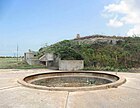| Fort Travis | |
| U.S. National Register of Historic Places | |
| Texas State Antiquities Landmark | |
 Fort Travis on Bolivar Peninsula Fort Travis on Bolivar Peninsula | |
  | |
| Location | SH 87 at Loop 108, Port Bolivar, Texas |
|---|---|
| Coordinates | 29°21′53″N 94°45′29″W / 29.36472°N 94.75806°W / 29.36472; -94.75806 |
| Area | 70 acres (28 ha) |
| Built | 1898 (1898) |
| NRHP reference No. | 05000247 |
| TSAL No. | 8200001368 |
| Significant dates | |
| Added to NRHP | March 30, 2005 |
| Designated TSAL | January 1, 1984 |

 Historical markers for Fort Travis (left) and Bolivar Point (right)
Historical markers for Fort Travis (left) and Bolivar Point (right)

 Battery Kimble (left) and 236 (right)
Battery Kimble (left) and 236 (right)
Fort Travis Seashore Park is also the historic Fort Travis, a 60 acres (24 ha) military site with bunkers. The park is located in an area known as Bolivar Point, on the extreme west side of the Bolivar Peninsula in Galveston County, Texas.
Early history
Mexican manuscript maps from 1816, show the location of campomentos by Jean Joseph Amable Humbert and Henry Perry. Francisco Xavier Mina built earthworks at Point Bolivar in 1816. In 1818, Dr. James Long led 300 men in an attempt to liberate Spanish Texas. He established fortifications here in August 1819, known as Fort Las Casas, before proceeding inland. During the winter of 1820-1821, Long's wife, Jane Herbert Wilkinson Long, remained behind with one child and one servant. Giving birth to a daughter, Jane became known as "The Mother of Texas". Samuel D. Parr started a settlement in 1838 that would become Port Bolivar. The original Fort Travis was located on the east end of Galveston. The present location was the Confederate Fort Green
In 1872 Bolivar Point Lighthouse was constructed north of Fort Travis.
History
Construction of Fort Travis began on 8 April 1898, and was completed in October 1899. The fort was named in honor of William B. Travis. The federal government purchased 97 acres (39 ha) in 1898 and completed Batteries Ernst and Davis. After the 1900 Galveston hurricane a 17 feet (5.2 m) seawall was built for storm protection. Battery Kimball was built in 1925 and Battery No. 236 was completed in 1943. Armament consisted of two twelve-inch guns on Barbette carriages and three-inch rapid-fire guns. In 1949 the installation was declared surplus and sold. In 1973 the Galveston County Commissioners Court purchased the site for use as a public park
Batteries
Battery Davis was built in 1898, and named after Lieutenant Thomas Davis, killed in 1847 during the Mexican-American War. This battery contained two eight-inch disappearing guns. Battery Ernst was built in 1898, and named after Lieutenant Rudolph Ernst, killed in 1847 during the Mexican-American War. This battery contained three pedestal guns with searchlights. Battery Kimble was built between August 1917 and April 1922, and named after Major Edwin R. Kimble, killed during WWI. This battery contained twelve inch guns with a range of 17 miles. Battery 236 was built at the start of WWII. This battery contained two six-inch guns within a casement that included a power plant, magazines, fire control, and crew quarters. During the war, 2500 troops were stationed at the fort.
Park
The park and playground is located within the boundaries of the historic Fort Travis and is under the jurisdiction of the Galveston County Department of Parks & Cultural Services. There are several amenities such as cabanas (6), camping areas, three covered picnic areas, and three wetland overlooks.
NRHP
The site was added to the National Register of Historic Places in Galveston County on 30 March 2006.
See also
References
- "National Register Information System". National Register of Historic Places. National Park Service. November 2, 2013.
- ^ Ft. Travis Seashore Park, United States Army Coastal Artillery Facility. Galveston County Department of Parks and Cultural Services brochure.
- A. Pat Daniels. "Bolivar Peninsula". Handbook of Texas Online. Texas State Historical Association. Retrieved 2019-07-13.
- A. Pat Daniels. "Port Bolivar, Tx". Handbook of Texas Online. Texas State Historical Association. Retrieved 2019-07-13.
- Linton, Tom (2009-10-26). "Fort Travis Seashore Park has many layers". The Daily News. Retrieved 2019-07-13.
- Darst, Maury. "Fort Travis". Handbook of Texas Online. Texas State Historical Association. Retrieved 2019-07-13.
- "Fort Travis Seashore Park has many layers". Galveston County Department of Parks & Cultural Services. Archived from the original on 2019-07-12. Retrieved 2019-07-13.
- "Parks, Recreation, Open Space and Conservation/Natural Resource Master Plan Galveston, County Texas" (PDF). Galveston County Department of Parks & Cultural Services. 1998. p. 299. Retrieved 2019-07-13. (updated in 2003)